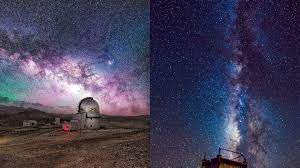Ladakh To Soon Have India’s First Dark Night Sky Reserve

Ladakh To Soon Have India’s First Dark Night Sky Reserve: Ladakh is all set to have India’s first Dark Night Sky Reserve at Hanle village in Changthang region. In about eighteen locations in Hanley, powerful telescopes will be installed for stargazing.
More About This Development: The administration of the Union Territory of Ladakh has donated eighteen telescopes to the trained youngsters of Hanley village.
December 2022 Current Affairs Quiz
About The Place: At an elevation of 4,500 meters, Hanley is home for the second-highest optical telescope in the world, established in 2001 by Indian Institute of Astrophysics.
About Its Potential: On his first visit to Hanley, Ladakh Lieutenant Governor RK Mathur was impressed with the area’s unique potential for Astrotourism.
All About The Transition: Following a tripartite MoU between UT Administration, Leh Hill council and Indian Institute of Astrophysics in June this year, necessary approvals from Department of Science and Technology and Ministry of Environment and Forests were issued for Dark sky sanctuary. Tashi Gyaltson, CEC of the Leh Hill Council, and MP Jamyang Tsering Namgyal, on the other hand, have convinced the villages of the importance of economic development through home stays and new tourism routes. LG Mr Mathur has kept establishment of Dark Sky Sanctuary on priority. He already instructed the concerned authorities to get affiliation with International Dark Sky Association and Star Light Foundation for Hanley Dark Sky Sanctuary. Sanctuary opens up personalized experiences to Astro tourists, economic opportunities for youths through the Telescope operation and villagers from the home stays.
About The Other Planning:
UT administration is also planning for mobile and static planetariums in the region. 24 youths from three hamlets of Hanley were provided with training by the Indian Institute of Astrophysics under the guidance of Engineering Chief Dorjey Angchuk. Locations for the installation of telescopes, including one large telescope in Punguk village, have been found.